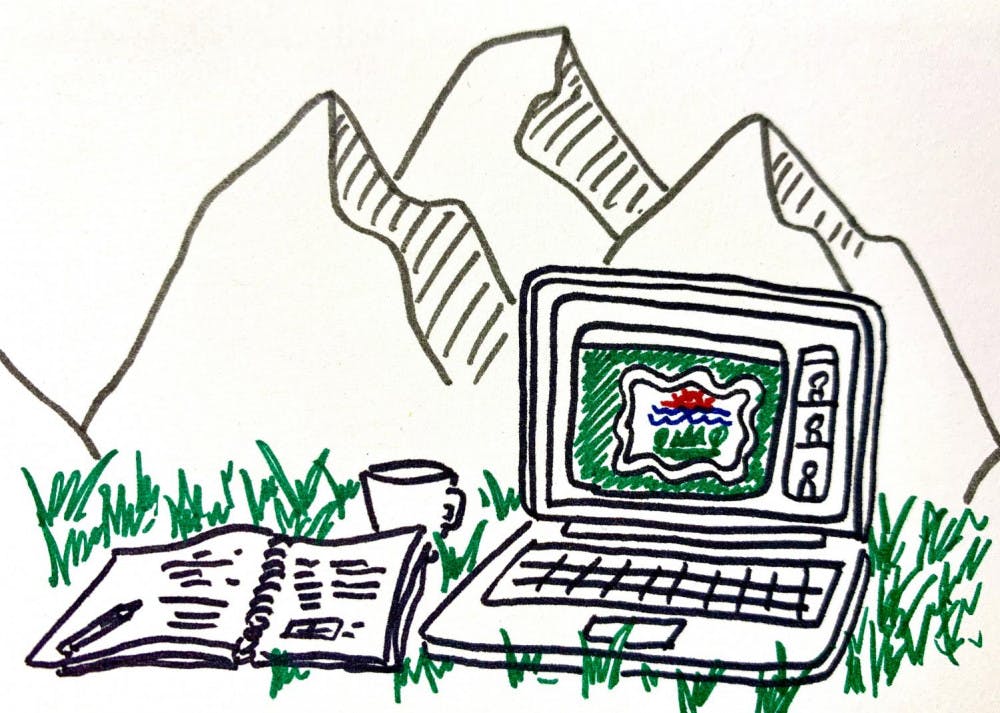In its first summer as part of Middlebury’s summer Language Schools, the School of Abenaki engaged 23 students in a two-week pilot program on Abenaki language and culture. Jesse Bowman Bruchac, a citizen of the Nulhegan Abenaki Tribe, led Middlebury’s first Native American language program. The school allowed all of its students to attend this year free of charge, something Bruchac noted as a demonstration of the college’s support of efforts to preserve indigenous culture and language in the area.
Like all of Middlebury’s Language Schools this summer, the program was conducted remotely.
“Being online helped to bring people together,” said Bruchac, who has spent his career traveling across New England and the country to teach. Bruchac has nearly 30 years of experience teaching the Abenaki language and working to preserve its culture.
Abenaki is considered an endangered language. It is still spoken throughout northern New England and in parts of Quebec, but few people are considered fluent.
School of Abenaki students ranged in age from 18 to 75, and Bruchac found it encouraging that some of the strongest speakers in the program were young people in their 20s. Twenty of the program’s 23 students are citizens of the Vermont-based Abenaki communities of Nulhegan, Elnu, Missisquoi and the Canadian reserve of Odanak in Quebec.
All students were members of the Abenaki language community, meaning that they had previous experience learning the language. The School of Abenaki enrolled both those with a relatively new interest in mastering the language and those who had been in its proximity for decades but wanted to ramp up their skills.
The program met for six hours a day, with two-hour sessions in the morning, afternoon and evening. Mornings featured formal lessons taught in a mix of English and Abenaki by Dr. Conor Quinn, a linguistics professor at the University of Southern Maine. Later in the day, Bruchac would lead participants in afternoon games, songs, crafts and other activities in Abenaki. Students spent their evening sessions doing homework together and giving small presentations in the language.
A special feature of this summer’s program was Kerry Wood’s two-day basket-weaving workshop.Students received materials in the mail and then used them to learn the craft live on Zoom with their peers. Aaron Wood, Kerry’s son, taught students about the black ash tree and how to make splints — the wooden ribbons that make up a basket — from harvested wood. Both mother and son are artists of the Vermont Abenaki Artist Association and gave their lessons in Abenaki. Other artists and performers made appearances throughout the program.
The program culminated in an hour-long presentation given entirely in Abenaki, with each student presenting for over two minutes.
Bruchac had never led a language program prior to serving as the director of the School of Abenaki at Middlebury. The Middlebury Language Pledge, a prominent element of the Language Schools, requires that students speak only in the language of their program. Bruchac said incorporating this feature into a pilot program for students who did not have much experience with prolonged immersion in the language was intimidating at first. Additionally, the remote modality meant that full immersion was not possible in the way it typically is for the on-campus language programs. But Bruchac said watching students’ online learning epiphanies was a powerful experience.
At the same time, Bruchac said he looks forward to the benefits that in-person classes will offer his students in the future. While he believes the sense of community was strengthened by online meetings, he thinks the experience would feel “more real” in person.
He is excited for future students of the program to be able to benefit from use of the language outside of the classroom, during meals and throughout other everyday activities.
Learning Zoom and Canvas technology was a beneficial skill to sharpen, according to Bruchac, as it can help bring together members of the Abenaki community to learn in new ways in the future. “We are going to keep that door open,” he said of online opportunities.
There is already interest for an in-person program next year, Bruchac said. While there are arrangements to reserve spots for Abenaki citizens first, Bruchac said there is room for anyone passionate to learn about the Abenaki language and culture, which he noted are inseparable.
“The Abenaki language needs speakers to help keep it alive,” Bruchac said, encouraging old and new learners to become part of the community.

Cat McLaughlin is a super-senior feb from Gilford, NH. As a political science major, she became interested in journalism through media studies. In her free time she enjoys alpine skiing and sailing. She also has worked as a ski coach at the Middlebury Snow Bowl, is a lover of Proc dining hall, is hooked on iced coffee, and watches the Pride and Prejudice movie at least 20 times per year.




